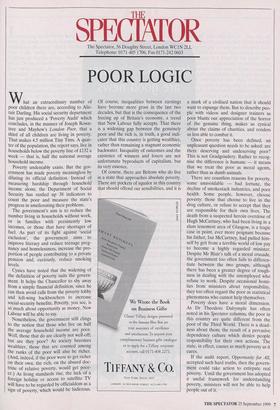SPE T CrATOR
The Spectator, 56 Doughty Street, London WC1N 2LL Telephone: 0171-405 1706; Fax 0171-242 0603
POOR LOGIC
What an extraordinary number of poor children there are, according to Alis- tair Darling. His social security department has just produced a 'Poverty Audit' which concludes, in the manner of Joseph Rown- tree and Mayhew's London Poor, that a third of all children are living in poverty. That makes 4.5 million Tiny Tims. A quar- ter of the population, the report says, live in households below the poverty line of £132 a week — that is, half the national average household income.
Poverty undeniably exists. But the gov- ernment has made poverty meaningless by diluting its official definition. Instead of measuring hardship through household income alone, the Department of Social Security has rustled up 38 indicators to count the poor and measure the state's progress in ameliorating their problems.
The government's aim is to reduce the number living in households without work, or in families with persistently low incomes, or those that have shortages of fuel. As part of its fight against 'social exclusion', the government aims to improve literacy and reduce teenage preg- nancy and homelessness, increase the pro- portion of people contributing to a private pension and, curiously, reduce smoking levels.
Cynics have noted that the widening of the definition of poverty suits the govern- ment. It helps the Chancellor to shy away from a simple financial definition, since he can then avoid calls from the poverty lobby and left-wing backbenchers to increase social-security benefits. Poverty, you see, is as much about opportunity as money, New Labour will be able to say. Nonetheless, the government still clings to the notion that those who live on half the average household income are poor. Well, those that do are clearly not well-off; but are they poor? As society becomes wealthier, those that are counted among the ranks of the poor will also be richer. (And, indeed, if the poor were to get richer on their own, the rich, on the absurd doc- trine of relative poverty, would get poor- er.) As living standards rise, the lack of a foreign holiday or access to satellite TV will have to be regarded by officialdom as a sign of poverty, which would be ludicrous. Of course, inequalities between earnings have become more gross in the last two decades, but that is the consequence of the freeing up of Britain's economy, a trend that New Labour fully accepts. That there is a widening gap between the genuinely poor and the rich is, in truth, a good indi- cator that this country is getting wealthier, rather than remaining a stagnant economic backwater. Inequality of outcomes and the existence of winners and losers are not unfortunate byproducts of capitalism, but its very essence.
Of course, there are Britons who do live in a state that approaches absolute poverty. There are pockets of squalor in this country that should offend our sensibilities, and it is a mark of a civilised nation that it should want to expunge them. But to describe peo- ple with videos and designer trainers as poor blunts our appreciation of the horror of the genuine thing, makes us cynical about the claims of charities, and renders us less able to combat it.
Once poverty has been defined, an unpleasant question needs to be asked: are there deserving and undeserving poor? This is not Gradgrindery. Rather to recog- nise the difference is humane — it means that we treat the poor as moral agents, rather than as dumb animals.
There are countless reasons for poverty, some unavoidable — bad fortune, the decline of smokestack industries, and poor health. Some people, however, choose poverty: those that choose to live in the drug culture, or refuse to accept that they are responsible for their own lives. The death from a suspected heroin overdose of Hugh McCartney, who had been living in a slum tenement area of Glasgow, is a tragic case in point, ever more poignant because his father, Ian McCartney, had pulled him- self by grit from a terrible world of low pay to become a highly regarded minister. Despite Mr Blair's talk of a moral crusade, the government too often fails to differen- tiate between the two groups, although there has been a greater degree of tough- ness in dealing with the unemployed who refuse to work. Despite occasional homi- lies from ministers about responsibility, they too often regard the poor as statistical phenomena who cannot help themselves.
Poverty does have a moral dimension. As Dr Theodore Dalrymple has often noted in his Spectator columns, the poor in this country are quite different from the poor of the Third World. There is a dead- ness about them; the result of a pervasive dependency culture which denies people responsibility for their own actions. The state, in effect, causes as much poverty as it cures.
If the audit report, Opportunity for All, accepted such hard truths, then the govern- ment could take action to extirpate real poverty. Until the government has adopted a useful framework for understanding poverty, ministers will not be able to help people out of it.


























































































 Previous page
Previous page